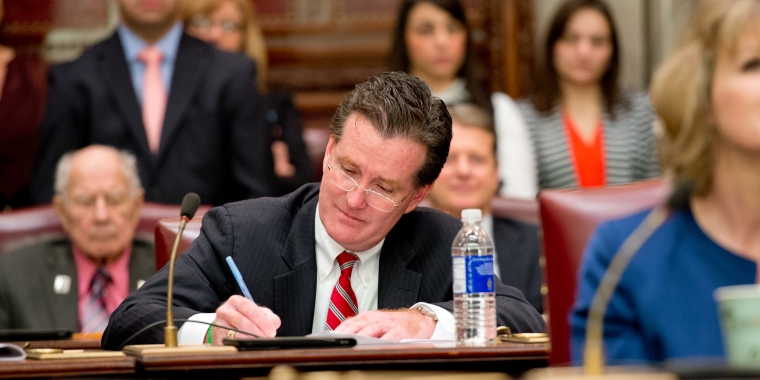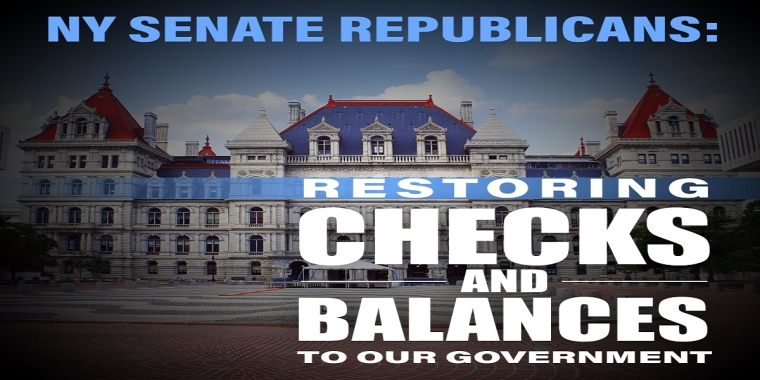
Senator Flanagan Announces New Laws For The New Year Including Property Tax Cap And Middle Class Tax Cut
John J. Flanagan
January 6, 2012
To help keep the residents of the 2nd Senate District informed, Senator Flanagan is highlighting some new state laws are in effect as of January 1, 2012. Of particular importance to many in our area, Senator Flanagan is proud that both the middle class tax cut that will reduce tax rates for millions of hardworking taxpayers and the two-percent property tax cap will go into effect and start providing taxpayers with much needed tax relief.
“My number one goal this year was to provide real tax relief to the residents of our area and I am proud to have worked with Governor Cuomo and my colleagues to start the process of bringing real tax reform to New York State. While these and other measures are great steps forward for the future of our state, there is clearly much more work to be done and I look forward to building on the successes of 2011,” stated Senator Flanagan, who voted for both those measures.
The middle class tax cut, which was recently approved by the Senate and signed into law by Governor Cuomo, will reduce tax rates on middle class taxpayers to their lowest levels in more than 50 years. About 4.4 million middle class taxpayers will receive a total of $690 million in personal income tax relief.
The property tax cap law, enacted in June, places a cap on the growth of school district and local government property taxes of two percent or the Consumer Price Index (CPI), whichever is lower.
Following this law’s effective date, any school district or local government seeking a growth of property taxes above this level will need to have it approved by 60% of its voting body. For schools that means that their upcoming budget vote will either need to be under 2% tax growth or be approved by 60% of its voters. To make sure that school districts and local governments are able to continue to deliver the services that communities have come to expect, the law does allow some budget items to be excluded from the cap including pension costs, certain legal settlements or judgments and certain capital costs.
In addition to the new tax cuts and the property tax cap, the following laws are also now in effect:
* Health insurance plans in New York State are required to cover orally administered chemotherapy treatments. The law corrects a discrepancy and ensures that chemotherapy treatment, no matter how administered, is covered by insurance companies. With oral chemotherapy, patients can take a pill in the comfort of their homes, to combat their diseases. This allows them to avoid multiple trips to the hospital for the more traditional intravenous or injectable forms of chemotherapy.
* Drivers on New York State roadways will be required to exercise additional caution when approaching, overtaking or passing any hazard vehicle. While New York State has required drivers to move over to adjacent lanes when approaching or passing an emergency vehicle on the side of the road, this new change will help protect all who are at accident scenes or other dangerous situations.
This new law provides an extra measure of safety for drivers and workers on the roadside who are performing such activities as helping a stranded or broken-down vehicle, snow removal, or other types of roadway maintenance and construction.
* A new law will strengthen DEC’s authority to ban products that contain mercury.
*A requirement that dental health facilities possess automatic external defibrillators on their premises.
* A ban on the sale of hookahs, water pipes, and shisha to minors. “Shisha” is any product made primarily of tobacco smoked or intended to be smoked in a hookah or water pipe.
*An authorization for the removal of fire commissioners for dereliction of duties including having an excessive number of unexcused absences from regularly scheduled meetings.
*A new law banning the sale of household dishwasher detergents that contain phosphorus, which is harmful to lakes, rivers and other water sources. The new law also places new limitations on the use of lawn fertilizers that contain phosphorous. A ban on phosphorus dish detergents used by commercial establishments will not take effect until July 1, 2013.



